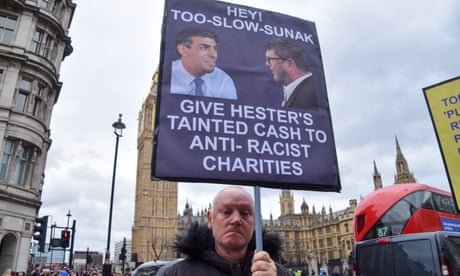希望而非仇恨警告称,“不安、愤怒”的选民容易受到极右极端主义的影响
该组织的年度报告指出反移民活动的兴起,并询问保守党选民是否“不再热爱民主”
政治记者 Ben Quinn 2024 年 3 月 14 日
一个反极端主义组织表示,民意调查显示,英国选民焦躁、愤怒、士气低落,其中一半以上对未来持悲观态度,显示出未来骚乱的警告信号。
超过四分之一的受访者 (43%) 称英国“正在衰落”,只有 6% 的人认为政治体系运作良好,79% 的人表示政客“不听像我这样的人的意见”。
这些调查结果包含在“希望而非仇恨”(HNH)发布的关于英国极端主义的最新年度报告中,该报告警告说,激进右翼在试图推动该运动组织所称的“分裂、民粹主义、反移民”的过程中,信心正在增强。 ,对气候持怀疑态度的政策”。
HNH 首席执行官尼克·劳尔斯 (Nick Lowles) 表示:“我们的民意调查中非常明显的悲观和衰落情绪可能会导致政府更迭。 但与此同时,如果新政府不被视为能够迅速实现有意义的变革,这种同样的情绪可能会引发新政府的情绪,这可能为日益自信的激进右翼打开大门——无论是来自更右翼的保守党还是外部民粹主义者 移动。”
在促使 HNH 询问保守党选民是否“不再热爱民主”的其他调查结果中,48% 打算在下次选举中投票给保守党的人表示,他们更喜欢“拥有一位有权凌驾于一切事务之上的强大而果断的领导人” 或者忽视议会”,而不是“拥有定期选举和多党制的自由民主”。
Focaldata 参与了 25,000 人的民意调查,其中三分之一的人认为“在某些情况下,为了捍卫你坚信的东西,可能需要使用暴力”。
议会广场上的一名抗议者举着标语牌,提及有关海丝特言论及其向保守党捐款的争论。
大多数选民表示,保守党应该放弃弗兰克·赫斯特的 1000 万英镑捐款
该报告监测了从新纳粹分子和阴谋论者到保守党和改革英国的右翼议员等团体和个人的活动,报告发现反移民激进主义去年继续主导极右翼。
HNH 研究人员监测到的反移民活动与 2022 年的水平相比增加了 20%,这是之前有记录以来的最高水平,而反移民示威活动比 2022 年增加了 18 倍。
2023 年,因恐怖相关罪行被定罪的极右活动人士和同情者数量创下历史新高。他们的平均年龄为 32 岁,其中 4 人是青少年。
HNH 注意到自哈马斯袭击以色列和以色列进攻加沙以来英国反犹太主义和反穆斯林仇恨有所抬头,并指出极右翼在这个问题上存在分歧,一些人优先考虑反犹太主义,另一些人则攻击穆斯林。
该组织还强调了英国政治领导层所宣扬的叙事的作用,并批评政府缺乏针对极右极端主义的明确计划。
HNH 高级政策和参与官员米斯巴·马利克 (Misbah Malik) 表示:“尤其是过去几年,保守党向右倾。 因此,毫不奇怪,在十月份冲突升级后,政治主流几乎立即开始传播一种懒惰但危险的伊斯兰比喻的叙事。”
民意调查的其他部分发现,中东冲突在英国的公众舆论中存在严重分歧,尽管大多数人并没有偏向某一方,回答“不在乎”或“不知道”。
研究显示,只有 38% 的公众选择立场,其中 22% 的人支持巴勒斯坦,16% 的人支持以色列。 略多于 20% 的人表示他们对双方均支持,而 27% 的人表示他们不支持任何一方。 其余人都表示不知道。
'Restless, angry' voters vulnerable to far-right extremism, warns Hope Not Hate
Group's annual report notes rise in anti-migrant activism and asks if Tory voters are ‘falling out of love with democracy’
British voters are restless, angry and demoralised and more than half of them are pessimistic about the future, according to polling that a counter-extremism organisation has said shows warning signs of future unrest.
More than one in four respondents (43%) described the UK as “declining”, just 6% agreed that the political system was working well and 79% said politicians “don’t listen to people like me”.
The findings are contained in the latest annual report on extremism in Britain released by Hope Not Hate (HNH), which warns that the radical right is growing in confidence as it attempts to push what the campaign group called “divisive, populist, anti-immigration, climate-sceptic policies”.
Nick Lowles, HNH’s CEO, said: “The sense of pessimism and declinism that is very evident in our polling is likely to lead to a change in government. But at the same time this very same mood could turn on a new administration if it is not seen as delivering meaningful change quickly, and this could open the door for an increasingly confident radical right – either from a more rightwing Conservative party or an outside populist movement.”
In other findings that prompted HNH to ask whether Tory voters were “falling out of love with democracy”, 48% of people intending to vote Conservative at the next election said they would prefer “having a strong and decisive leader who has the authority to override or ignore parliament” over “having a liberal democracy with regular elections and a multiparty system”.
A third of those who took part in the 25,000-person poll by Focaldata thought that “in certain circumstances violence can be necessary to defend something you strongly believe in”.
Tories should give up £10m Frank Hester donation, most voters say
The report, which monitors activities of groups and individuals ranging from neo-Nazis and conspiracy theorists through to MPs on the right of the Conservative party and Reform UK, found that anti-migrant activism continued to dominate the far right last year.
Anti-migrant activity monitored by HNH researchers rose by 20% compared with 2022 levels, which were the previous highest on record, while there was an 18-fold increase in anti-migrant demonstrations from 2022.
A record number of far-right activists and sympathisers were convicted of terror-related offences in 2023. Their average age was 32, and four were teenagers.
Noting the rise in antisemitism and anti-Muslim hatred in the UK since the Hamas attacks on Israel and Israel’s offensive in Gaza, HNH noted that the far right was divided on the issue, with some prioritising antisemitism and others attacking Muslims.
The organisation also highlighted the role of what it described as narratives perpetuated by the UK’s political leadership, and criticised what it said was a lack of a clear plan from the government for what to do about far-right extremism.
Misbah Malik, HNH’s senior policy and engagement officer, said: “The last few years in particular have seen the Conservative party sliding to the right. Unsurprisingly therefore, almost immediately after the conflict escalated in October, the political mainstream jumped to propagate a narrative that lazily but dangerously draws from Islamophic tropes.”
Other sections of the polling found that the conflict in the Middle East had deeply divided public opinion in the UK, although a majority of people did not take one side over another, answering “do not care” or “don’t know”.
Only 38% of the public choose a side, according to the research, with 22% siding with the Palestinians and 16% with Israel. A little more than 20% said they supported both sides equally, while 27% said they supported neither side. The rest said they didn’t know.

